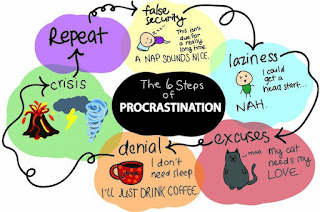Procrastination
is a challenge we have all faced at one point or another. For as long as humans
have been around, we have been struggling with delaying, avoiding, and
procrastinating on issues that matter to us.
During our
more productive moments, when we temporarily figure out how to stop
procrastinating, we feel satisfied and accomplished. Today, we're going to talk
about how to make those rare moments of productivity more routine. The purpose
of this guide is to break down the science behind why we procrastinate, share
proven frameworks you can use to beat procrastination, and cover useful
strategies that will make it easier to take action.
I. The
Science behind Procrastination
Let's start
by getting the basics nailed down. What is procrastination? What does
procrastination mean? What exactly are we dealing with here?
What is
Procrastination?
Human beings
have been procrastinating for centuries. The problem is so timeless, in fact,
that ancient Greek philosophers like Socrates and Aristotle developed a word to
describe this type of behavior: Akrasia.
Akrasia is
the state of acting against your better judgment. It is when you do one thing
even though you know you should do something else. Loosely translated, you
could say that akrasia is procrastination or a lack of self-control.
Here's a
modern definition:
Procrastination
is the act of delaying or postponing a task or set of tasks. So, whether you
refer to it as procrastination or akrasia or something else, it is the force
that prevents you from following through on what you set out to do.
Why Do We
Procrastinate?
Ok,
definitions are great and all, but why do we procrastinate? What is going on in
the brain that causes us to avoid the things we know we should be doing?
This is a
good time to bring some science into our discussion. Behavioral psychology
research has revealed a phenomenon called “time inconsistency,” which helps
explain why procrastination seems to pull us in despite our good intentions.
Time inconsistency refers to the tendency of the human brain to value immediate
rewards more highly than future rewards.
The best way
to understand this is by imagining that you have two selves: your Present Self
and your Future Self. When you set goals for yourself — like losing weight or
writing a book or learning a language — you are actually making plans for your
Future Self. You are envisioning what you want your life to be like in the
future. Researchers have found that when you think about your Future Self, it
is quite easy for your brain to see the value in taking actions with long-term
benefits. The Future Self values long-term rewards.
However,
while the Future Self can set goals, only the Present Self can take action.
When the time comes to make a decision, you are no longer making a choice for
your Future Self. Now you are in the present moment, and your brain is thinking
about the Present Self. Researchers have discovered that the Present Self
really likes instant gratification, not long-term payoff.
The
Procrastination-Action Line
You cannot
rely on long-term consequences and rewards to motivate the Present Self.
Instead, you have to find a way to move future rewards and punishments into the
present moment. You have to make the future consequences become present
consequences.
This is
exactly what happens during the moment when we finally move beyond
procrastination and take action. For example, let's say you have a report to
write. You've known about it for weeks and continued to put it off day after
day. You experience a little bit of nagging pain and anxiety thinking about
this paper you have to write, but not enough to do anything about it. Then,
suddenly, the day before the deadline, the future consequences turn into
present consequences, and you write that report hours before it is due. The
pain of procrastinating finally escalated and you crossed the “Action Line.”
There is
something important to note here. As soon as you cross the Action Line, the
pain begins to subside. In fact, being in the middle of procrastination is often
more painful than being in the middle of doing the work. Point A on the chart
above is often more painful than Point B. The guilt, shame, and anxiety that
you feel while procrastinating are usually worse than the effort and energy you
have to put in while you're working. The problem is not doing the work, it's
starting the work.
If we want
to stop procrastinating, then we need to make it as easy as possible for the
Present Self to get started and trust that motivation and momentum will come
after we begin
Take the bold step and do it now, cease from from procrastinating...
Just do it.
All image source: GoogleImages
Thanks for Reading ... Change is what we need.
By Motoma LW.

















No comments:
Post a Comment